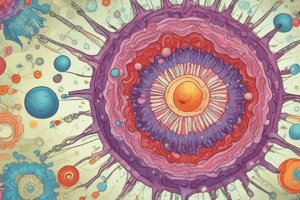Podcast
Questions and Answers
Which of the following best describes the biological components of the innate immune system?
Which of the following best describes the biological components of the innate immune system?
- Macrophages and natural killer cells (correct)
- Antigens and antibodies
- T cells and B cells
- Interleukins and interferons
What is the mechanism of action of the complement system in the immune response?
What is the mechanism of action of the complement system in the immune response?
- Activation of T cell proliferation
- Production of antibodies
- Direct killing of infected cells
- Opsonization and lysis of pathogens (correct)
Which type of hypersensitivity reaction involves the recruitment of T lymphocytes?
Which type of hypersensitivity reaction involves the recruitment of T lymphocytes?
- Type III
- Type IV (correct)
- Type I
- Type II
In humoral immune responses, which cell type is responsible for producing antibodies?
In humoral immune responses, which cell type is responsible for producing antibodies?
What are the primary causes of immunodeficiency?
What are the primary causes of immunodeficiency?
Which cellular component is involved in the innate immune response to infections?
Which cellular component is involved in the innate immune response to infections?
Which of the following characteristics is NOT a key feature of the immune system?
Which of the following characteristics is NOT a key feature of the immune system?
What type of immunity requires exposure to an antigen in order to become activated?
What type of immunity requires exposure to an antigen in order to become activated?
The identity of the foreign material that led to the first immune response is remembered, conferring long-term immunity against infections. Which key feature of the immune system does this describe?
The identity of the foreign material that led to the first immune response is remembered, conferring long-term immunity against infections. Which key feature of the immune system does this describe?
Which category of pathogens includes viruses, bacteria, mycobacteria, parasites, and fungi?
Which category of pathogens includes viruses, bacteria, mycobacteria, parasites, and fungi?
Which book and edition are recommended for further reading on this topic?
Which book and edition are recommended for further reading on this topic?
Which science examines the structure and function of the immune system?
Which science examines the structure and function of the immune system?
Which phase of the immune reaction is mediated through multiple pathways that act synergistically for optimal effect?
Which phase of the immune reaction is mediated through multiple pathways that act synergistically for optimal effect?
What characteristic enables the immune system to distinguish between normal self, altered self, and non-self (foreign material)?
What characteristic enables the immune system to distinguish between normal self, altered self, and non-self (foreign material)?
Which type of hypersensitivity reaction involves the formation of immune complexes and activation of the complement system?
Which type of hypersensitivity reaction involves the formation of immune complexes and activation of the complement system?
What is the cell type responsible for antigen presentation in the immune system?
What is the cell type responsible for antigen presentation in the immune system?
Which of the following is NOT a characteristic of the innate immune system?
Which of the following is NOT a characteristic of the innate immune system?
What type of hypersensitivity reaction is characterized by the involvement of T lymphocytes and delayed onset of symptoms?
What type of hypersensitivity reaction is characterized by the involvement of T lymphocytes and delayed onset of symptoms?
Which component of the immune system is responsible for producing antibodies in response to antigens?
Which component of the immune system is responsible for producing antibodies in response to antigens?
Which category of pathogens includes helminths, protozoa, and ectoparasites?
Which category of pathogens includes helminths, protozoa, and ectoparasites?
Which characteristic of the immune system involves the ability to control the type, intensity, and duration of the immune reaction?
Which characteristic of the immune system involves the ability to control the type, intensity, and duration of the immune reaction?
What confers long-term immunity against infections by enabling an accelerated reaction during the secondary immune response?
What confers long-term immunity against infections by enabling an accelerated reaction during the secondary immune response?
Which type of immunity does not require prior exposure to a microbe to mount an immune response?
Which type of immunity does not require prior exposure to a microbe to mount an immune response?
Which type of pathogens include viruses, bacteria, mycobacteria, parasites, and fungi?
Which type of pathogens include viruses, bacteria, mycobacteria, parasites, and fungi?
What is the primary function of the innate immune system?
What is the primary function of the innate immune system?
Which cell type is responsible for producing antibodies in humoral immune responses?
Which cell type is responsible for producing antibodies in humoral immune responses?
Which characteristic allows the immune system to distinguish between normal self, altered self, and non-self (foreign material)?
Which characteristic allows the immune system to distinguish between normal self, altered self, and non-self (foreign material)?
Which phase of the immune reaction is mediated through multiple pathways that act synergistically for optimal effect?
Which phase of the immune reaction is mediated through multiple pathways that act synergistically for optimal effect?
What science examines the structure and function of the immune system?
What science examines the structure and function of the immune system?
What are the general characteristics of immunity?
What are the general characteristics of immunity?



